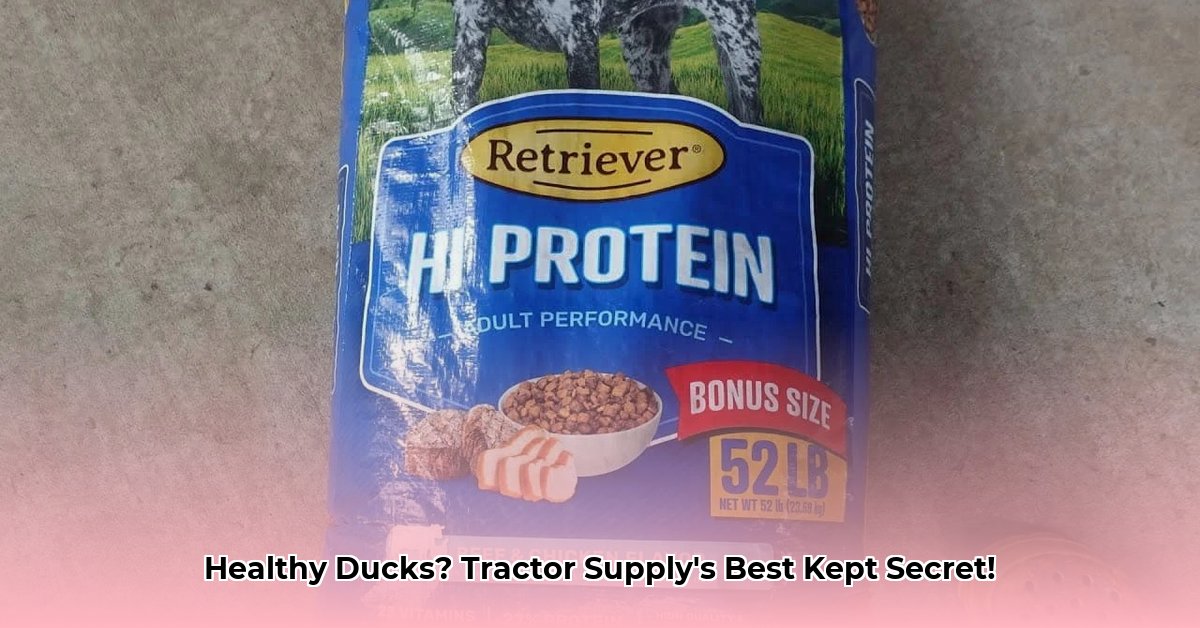
Understanding Your Ducks' Nutritional Needs
Raising healthy ducks starts with understanding their nutritional requirements. Just like humans, ducks need a balanced diet of protein, carbohydrates, healthy fats, vitamins, and minerals. However, the specific needs vary depending on factors such as age, breed, and purpose (e.g., egg laying, meat production). Young, growing ducks need more protein than adults, while laying hens require extra calcium for strong eggshells. A varied diet is crucial for overall health and well-being. Don't be afraid to experiment – your ducks will let you know what's working! For alternative livestock options, check out other poultry options.
Choosing the Right Duck Feed at Tractor Supply
Tractor Supply offers a variety of duck feeds, making it easy to find options for your flock. To choose the best feed, follow these steps:
Read the Label Carefully: Look for feed specifically designed for ducks, indicating whether it's for ducklings (starter feed), growing ducks (grower feed), or laying hens (layer feed).
Analyze the Ingredient List: High-quality duck feed typically includes whole grains (corn, wheat, oats), protein sources (soybean meal, fish meal), and essential vitamins and minerals. Avoid feeds with excessive fillers or artificial ingredients.
Compare Price and Nutrition: Compare the cost per pound and the nutritional content of different feeds to find the best value for your money. The most expensive isn't always the best.
A Step-by-Step Guide to Selecting the Perfect Feed
Let's break down the process into actionable steps:
Step 1: Assess Your Ducks' Needs: Determine the age and purpose of your ducks. Are they ducklings, adults, or laying hens? This determines the type of feed they require.
Step 2: Decipher the Ingredient List: Focus on whole grains and adequate protein sources. Avoid feeds with low-quality fillers.
Step 3: Conduct a Comparative Analysis: Compare the cost per pound and nutritional content of different feeds from Tractor Supply. Find the most efficient and nutritious option.
Step 4: Supplement with Natural Foods: Enhance your ducks' nutrition with fresh greens (duckweed, kale, spinach), fruits (apples, berries), vegetables (carrots), and access to insects and grit for proper digestion.
Step 5: Observe Your Ducks Carefully: Monitor their energy levels, feather condition, and egg production (if applicable). Adjust their diet accordingly. Healthy ducks are active and have shiny feathers. Are your ducks meeting your goals?
Tractor Supply Duck Feed: Pros and Cons
| Feature | Pros | Cons |
|---|---|---|
| Availability | Widely available and convenient. | Selection may vary by location. |
| Price | Generally competitive, especially in bulk. | Can be pricier than homemade feed (though homemade requires more effort). |
| Nutritional Value | Many options provide balanced nutrition for different life stages. | Quality can vary among brands; careful label reading is crucial. |
| Convenience | Easy to purchase and store. | Requires ongoing monitoring of your ducks' health and dietary needs. |
Supercharging Your Ducks' Diet with Supplements
While commercial feed provides a solid base, supplements enhance your ducks' health and productivity.
- Leafy Greens: Excellent sources of vitamins and minerals.
- Fruits and Vegetables: Offer variety and additional nutrients.
- Insects and Water Bugs: Natural foraging provides essential protein.
- Grit: Crucial for proper digestion.
Reducing the Environmental Impact of Duck Farming Through Feed Optimization
Did you know your feed choices impact the environment? Let's explore sustainable practices:
Optimize Feed Conversion Ratios (FCR): A lower FCR (less feed needed per unit of egg or meat production) means less waste and a smaller environmental footprint. Achieve this through precise feeding schedules, proper storage, and monitoring feed intake.
Select Sustainable Ingredients: Favor locally sourced ingredients to reduce transportation emissions, and consider feeds using sustainable protein sources like insects or algae.
Manage Manure and Waste: Efficient feed use minimizes manure production. Explore sustainable manure management techniques such as composting.
Invest in Efficient Feeding Systems: Automated feeders can improve feed distribution, reduce waste, and promote healthier ducks.
By following these guidelines, you can raise healthy, productive ducks while minimizing your farm's environmental impact. Remember, a happy duck is a healthy duck, and a healthy duck is a sustainable duck!